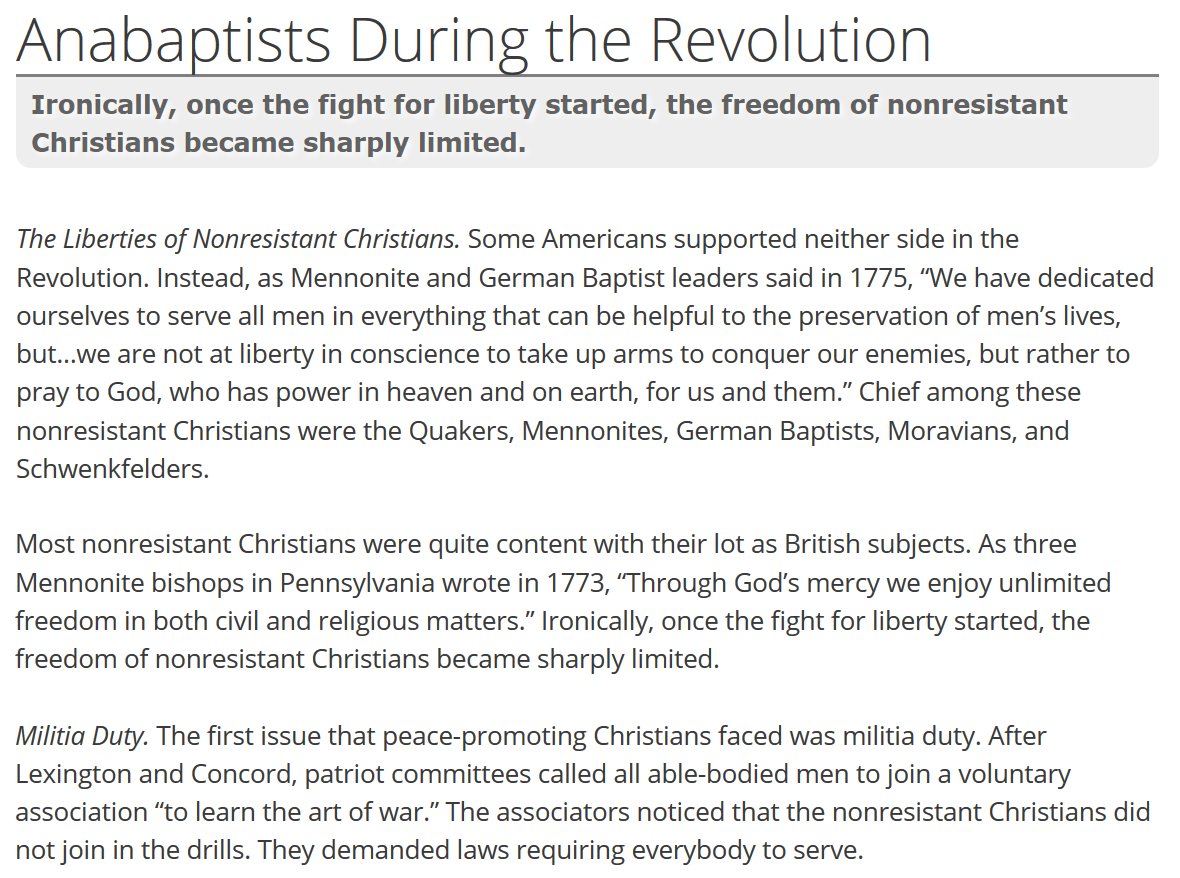The Liberties of Nonresistant Christians. Some Americans supported neither side in the Revolution. Instead, as Mennonite and German Baptist leaders said in 1775, “We have dedicated ourselves to serve all men in everything that can be helpful to the preservation of men’s lives, but…we are not at liberty in conscience to take up arms to conquer our enemies, but rather to pray to God, who has power in heaven and on earth, for us and them.” Chief among these nonresistant Christians were the Quakers, Mennonites, German Baptists, Moravians, and Schwenkfelders.
Most nonresistant Christians were quite content with their lot as British subjects. As three Mennonite bishops in Pennsylvania wrote in 1773, “Through God’s mercy we enjoy unlimited freedom in both civil and religious matters.” Ironically, once the fight for liberty started, the freedom of nonresistant Christians became sharply limited.
Militia Duty. The first issue that peace-promoting Christians faced was militia duty. After Lexington and Concord, patriot committees called all able-bodied men to join a voluntary association “to learn the art of war.” The associators noticed that the nonresistant Christians did not join in the drills. They demanded laws requiring everybody to serve.
In November 1775, Mennonite and German Baptist ministers sent A Short and Sincere Declaration to the Pennsylvania assembly. They suggested an alternative to militia duty. They would donate money to help poor families left destitute because their men were off fighting. Instead Pennsylvania passed a law levying a special war tax on all non-associators. Later it said nonresistant Christians could hire substitutes or pay a fine. Most nonresistant Christians refused to do either, because as the Short and Sincere Declaration stated, they found “no freedom in giving, or doing, or assisting in anything by which men’s lives are destroyed or hurt.” Therefore, Patriot officials confiscated their property to pay the tax and fines.
Who is Caesar?
Independence created another problem for the nonresistant Christians. Was King George III or was the Continental Congress the Caesar they were to obey? Many of them had promised obedience to the king when they came to America. Breaking their word was seen as a serious sin. Also, the king had protected their liberties. Now the patriots were taking them away.
In the end the nonresistant Christians put their trust in the words of the prophet Daniel in the Bible, “He removeth kings and setteth up kings” (Daniel 2:21). They patiently waited for the outcome of the war to find out who God would set up as Caesar. In the meantime they followed a pattern of strict neutrality. They refused to help either side to fight.
However, when hungry, sick, or wounded soldiers, whether patriot or redcoat, needed aid, the nonresistant Christians gave it. As a Hessian officer said, “They are the most hospitable to us.” The patriots did not understand this impartial love. They threatened men like Mennonite Christian Weaver with a whipping for feeding runaway British prisoners even though he had done the same for Continental soldiers.
Source: US Anabaptists during the Revolutionary War (excerpts from the fifth grade social studies course produced by Christian Light Publications)

